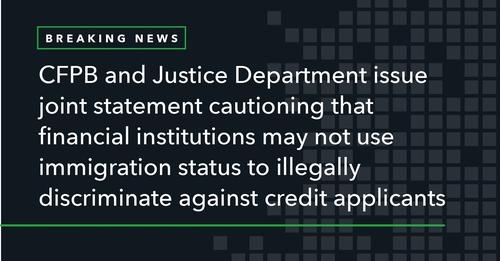The Justice Department and Consumer Financial Protection Bureau (CFPB) issued a joint statement today that reminds financial institutions that all credit applicants are protected from discrimination on the basis of their national origin, race and other characteristics covered by the Equal Credit Opportunity Act (ECOA), regardless of their immigration status. The Justice Department and CFPB are issuing this statement because consumers have reported being rejected for credit cards as well as for auto, student, personal and equipment loans because of their immigration status, even when they have strong credit histories and ties to the United States and are otherwise qualified to receive the loans.
While the ECOA allows a creditor to consider an applicant’s immigration status when necessary to ascertain the creditor’s rights regarding repayment, creditors should be aware that unnecessary or overbroad reliance on immigration status, including when that reliance is based on bias, may run afoul of the law.
“Lenders should not deny people the opportunity to take out a loan to buy a home, build their businesses or otherwise pursue their financial goals because of unlawful bias and without regard to their actual ability to repay,” said Assistant Attorney General Kristen Clarke of the Justice Department’s Civil Rights Division. “This guidance reminds lenders that denying someone access to credit based solely on their actual or perceived immigrant status may violate federal law.”
“Fair access to credit is crucially important for building wealth and strengthening household financial stability,” said CFPB Director Rohit Chopra. “The CFPB will not allow companies to use immigration status as an excuse for illegal discrimination.”
Some financial institutions have maintained blanket policies denying credit to individuals based on their immigration status, regardless of their personal circumstances and demonstrated ability to repay, arguing that the ECOA, and the regulation that implements it, protect them whenever they consider immigration status in making a credit decision. Others have incorrectly claimed that the Act shields lenders from liability under other federal and state civil rights laws that bar discrimination on the basis of someone’s status as an immigrant or noncitizen.
The joint statement explains that while the ECOA allows creditors to consider immigration status when necessary to ascertain the creditor’s rights regarding repayment, unnecessary or overbroad reliance on immigration status may violate the Act’s prohibition of discrimination on the basis of national origin, race or another prohibited basis. The joint statement also confirms that neither the ECOA nor its regulations provide companies a safe harbor with respect to other laws barring discrimination on the basis of immigration status.
The Civil Rights Division enforces federal laws that protect individuals from discrimination based on your race, color, national origin, disability status, sex, religion, familial status or loss of other constitutional rights. If you believe your civil rights, or someone else’s, have been violated, submit a report using our online form.
The CFPB is a 21st century agency that implements and enforces federal consumer financial law and ensures that markets for consumer financial products are fair, transparent and competitive. For more information, visit consumerfinance.gov.
Consumers can submit complaints about financial products or services by visiting the CFPB’s website or by calling (855) 411-CFPB (2372). Employees who believe their companies have violated federal consumer financial protection laws are encouraged to send information about what they know to whistleblower@cfpb.gov. To learn more about reporting potential industry misconduct, visit the CFPB’s website.

